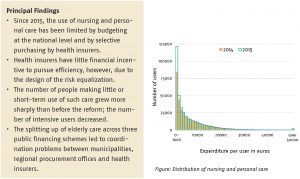Home care use after the Dutch long-term care reform in 2015
“2015 Reforms have not yet lead to a more efficient use of senior care”
A major objective of 2015 Long-term care Reform instituted in 2015 was to enhance the fi-nancial sustainability of elderly care in the Netherlands. Expenditure growth was curtailed through financial incentives and other measures to induce a more efficient use of care.
As it turns out, though, the use of nursing and personal care increased more quickly than before the reforms. This thus raises the question of whether the reforms have led to a more efficient use of such services.

Key Takeaways for the Industry
- Health insurers (and regional procurement offices) have limited financial incentives for achieving efficiency; better risk equalization could strengthen those incentives. A better allocation of block grants for assistance is needed to weaken the financial incentive for cost shifting for municipalities.
- In addition, a better understanding of the quality differences among providers of in-home nursing services is needed.
- The incentives for care recipients could be enhanced by employing comparable eligibility criteria and coinsurance rates for comparable forms of home care.




